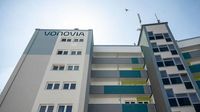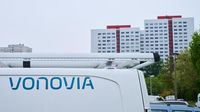Germany's largest real estate company, Vonovia, is on a path to recovery after a tumultuous period marked by significant losses and economic challenges. On March 19, 2025, CEO Rolf Buch announced during a conference call that the company has "released the brake and is back on the gas pedal," signaling a renewed focus on growth and profitability.
Despite reporting a loss of €962 million for 2024, a significant improvement from the nearly €6.8 billion loss the previous year, Vonovia is optimistic about its future. Buch stated, "We are coming out of the crisis earlier than many others," reflecting the company's operational stability and strategic direction.
The improvements in Vonovia’s financial health are evident in several key areas. The company's earnings before interest, taxes, depreciation, and amortization (EBITDA) rose slightly by 1.6 percent to over €2.63 billion, and rental income increased by 3.5 percent to an average of €8.01 per square meter, which is above the national average of €7.89 per square meter. Buch expressed confidence that these upward trends will continue, projecting an increase in earnings to €2.8 billion for 2025 and reaching as high as €3.5 billion by 2028.
Investors are also set to benefit, with a dividend proposal of €1.22 per share, up from €0.90 per share in the prior year. This has been welcomed by shareholders who have weathered the company’s challenges over the last couple of years. Buch noted, "Now is the time for us to fully unleash our potential and move forward as a market leader with new perspectives."
In the context of the broader economic environment, Vonovia has managed to build a cash buffer of about €11 billion over the past three years through property sales. This has enabled the company to continue investing in modernization and new construction projects, with plans to allocate approximately €1.2 billion in such efforts during 2025, including the expansion of photovoltaics.
However, the company remains cautious as it navigates the potential impacts of rising interest rates, which have made refinancing challenging. Buch acknowledged the threat posed by increasing bond yields, stating that it could delay capital-intensive investments, slowing the pace of some construction projects. Yet, he emphasized that investment in housing remains a priority, as the demand for living space in urban centers continues to rise.
For Vonovia to achieve its long-term goal of constructing around 70,000 new apartments on its own land, Buch highlighted the need for favorable political conditions that would drive down construction costs significantly—by approximately 30 percent to about €3,500 per square meter. Discussion of the 'Construire' initiative, a planning approach intended to simplify construction, could facilitate this process.
Reaction to the company's latest financial disclosures has been positively reflected in its stock performance, which rose by almost three percent on the announcement of the figures. After some turbulent weeks under pressure, analysts from J.P. Morgan have noted a potential bullish outlook on Vonovia shares, suggesting that they could be in line for a comeback.
In summary, Vonovia is positioning itself well for a rebound amidst challenging market conditions. With a strategic focus on modernization, profitability, and shareholder returns, it aims to leverage the high demand for housing to emerge stronger from its recent trials. The signs of stabilization in earnings and rental income growth illustrate that the company is indeed navigating its way back to serious operational potential.








